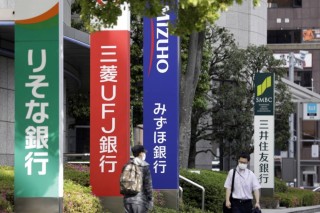Loading
Search
▼ Japanese Banks Brace For Anti-Russia Sanctions
- Category:Other
Japanese banks are rushing to collect information to assess the degree of impact from possible international sanctions on Russia on outstanding loans they have in the country.
Restricting transactions with Russian banks, including expelling them from the Society for Worldwide Interbank Financial Telecommunication, or SWIFT, is emerging as an option that major economies may take if Russia invades Ukraine. Banks in Japan are increasingly concerned about such a move, which is bound to affect them.
At the end of September last year, Japan’s three megabanks — MUFG Bank, Sumitomo Mitsui Banking Corp. and Mizuho Bank — had a total of some ¥500 billion in loans in Russia. The balance of loans in Russia stood at ¥134.5 billion at the government-affiliated Japan Bank for International Cooperation as of the end of March 2021.
The outstanding loans include syndicated loans for resources development projects, such as for liquefied natural gas, and ruble-denominated loans to Japanese companies with business in Russia.
On Monday, the finance ministers of the Group of Seven major industrial countries, including Japan and the United States, released a joint statement expressing their readiness to impose “economic and financial sanctions which will have massive and immediate consequences on the Russian economy” in the event of Moscow’s military aggression against Ukraine.
Banning exports of high-tech products to Russia, restricting imports of some goods from Russia and freezing assets of political and business leaders, such as Russian President Vladimir Putin, are also being considered as options for sanctions on Moscow.
“We’re rushing to gather information and conduct simulations,” a source linked to a major Japanese bank said.
After Russia annexed Crimea from Ukraine in 2014, dollar-denominated transactions with Russian banks via U.S. banks were restricted. Japanese and other banks are extending mainly euro-denominated loans in Russia as a result, and stronger restrictions would affect the settlement of transactions.
“The possibility of a large-scale invasion is low,” said Manabu Kato, a JBIC official in charge of geopolitical risk management.
But the situation might change unexpectedly as tensions remain high in areas around the Russia-Ukraine border.
“Price rises for crude oil and other energy sources reflecting the tense Ukraine situation may add to inflationary pressure and in turn accelerate monetary tightening” in the United States and Europe, said Shota Akimoto, SMBC Nikko Securities Inc.’s economist for emerging countries.
- February 16, 2022
- Comment (0)
- Trackback(0)


